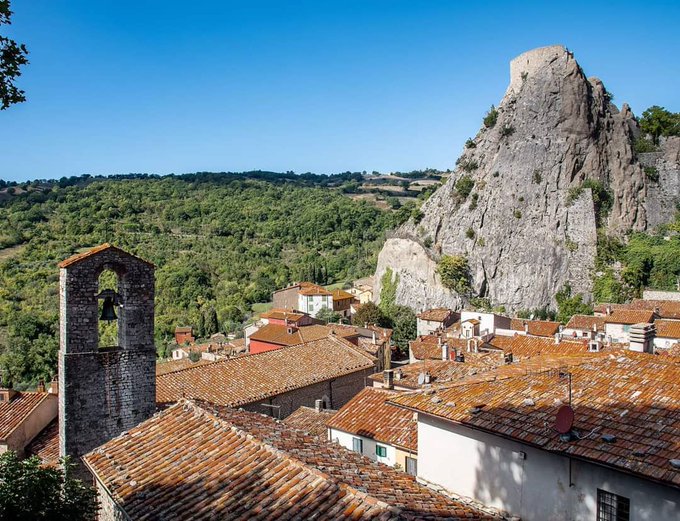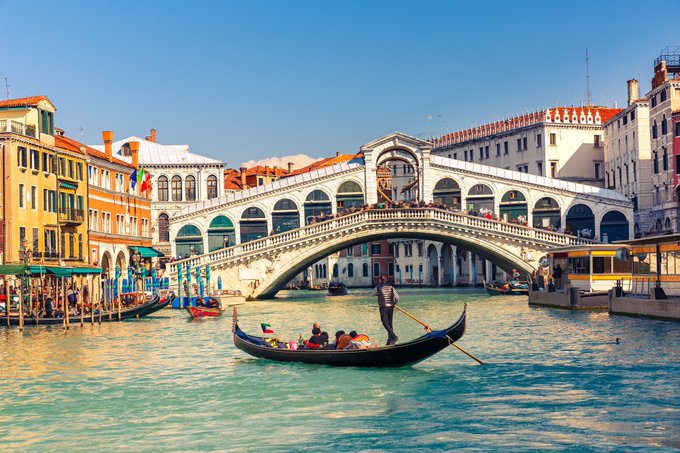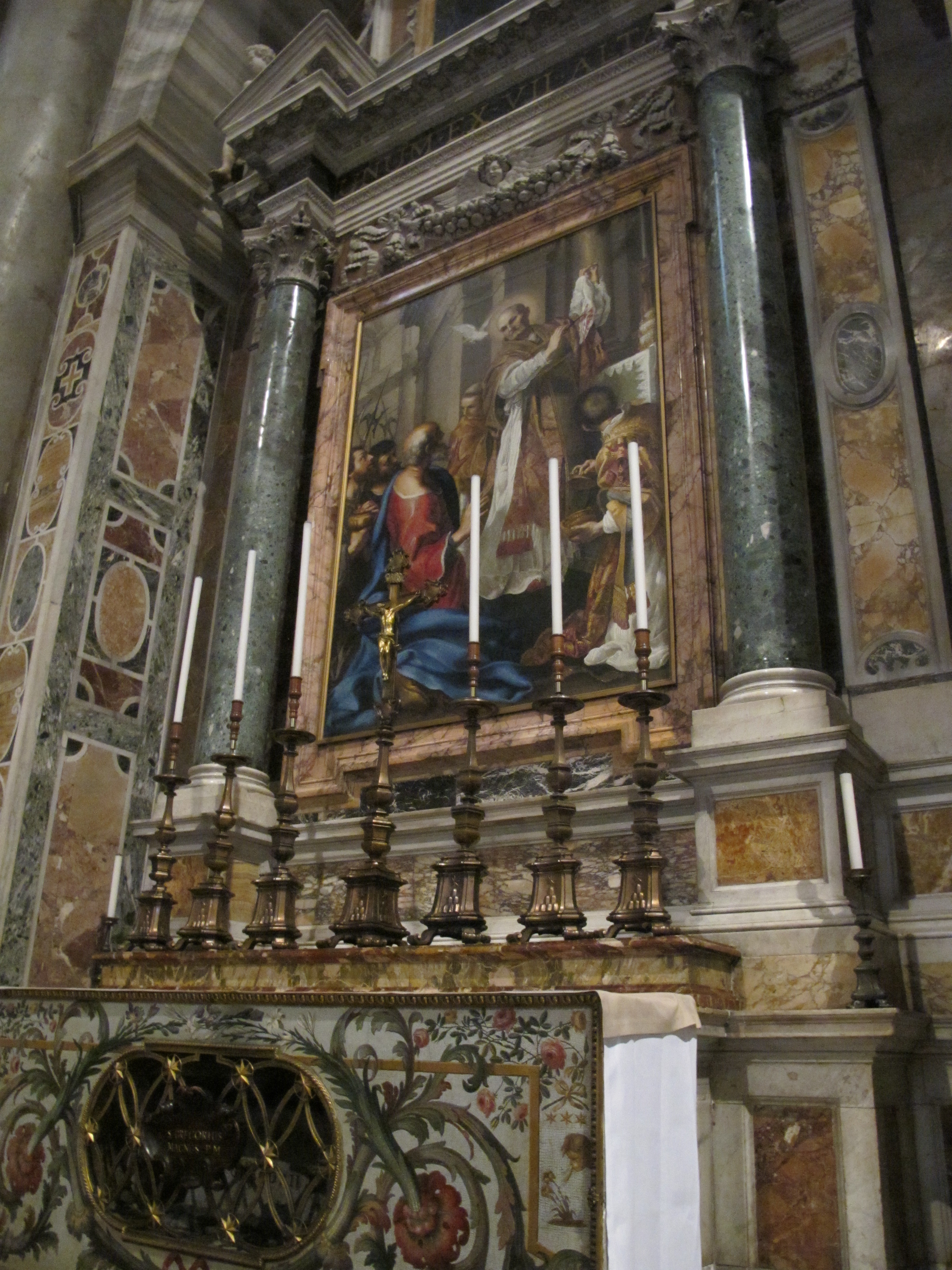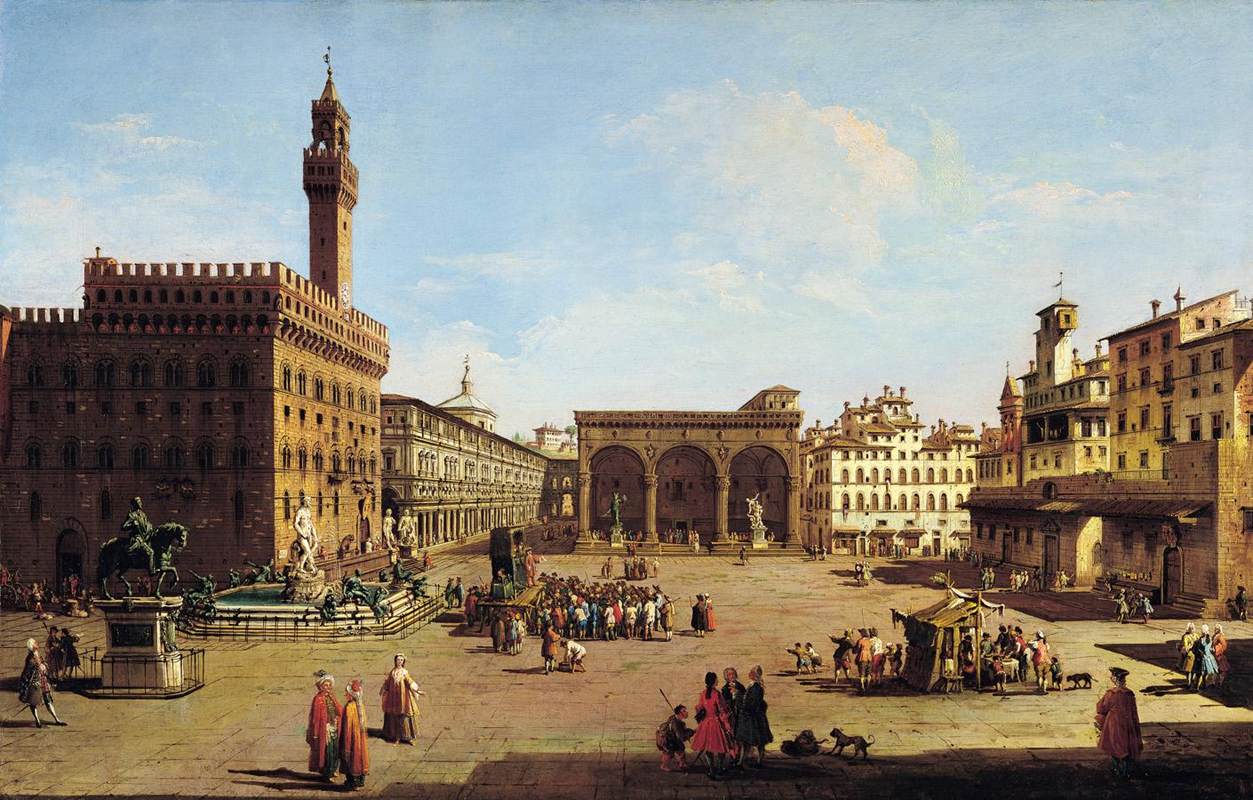Village of Roccalbegna
Tag: Italy
– For the context of these translations click here –
The altar of Gregory in St. Peter’s Basilica
contains the remains of Pope Gregory.
‘Thinking different from most—almost a crime worthy of death’
Soon this pope, like most of his predecessors and especially those who followed him, intervened harshly against those who thought differently, against all non-Catholics. His great goal was propagatio fidei, the planned extension of papal power, at almost any cost.
For this reason he interfered in the affairs of England and in the Frank-Merovingian kingdom, whose kings he vainly sought to win over to ecclesiastical reform. He recommended torture and imprisonment as coercive means, and occasionally also the peaceful transformation of pagan places of worship or Gentile customs, ‘so that people thus confidently go to the usual places’, always following the circumstances. He also advised, on occasion, promising converts a tax cut and ‘converting’ the stubborn with higher taxes. To the Sardinians, who still persisted in their paganism, their bishop had to Christianise them by force, as if they were slaves!
But not only did Gregory propagate the conversion of the ‘pagans’ in Sardinia, Sicily, Corsica, and elsewhere. He also tirelessly fought ‘heresy’ and intervened with great zeal in the war against heretics within the missionary war for the expansion of the faith outward, gladly called ‘defence of the Roman Church’ or ‘the pastoral care of the pope’. Not even those who were simply outsiders or disagreed could remain unmolested. ‘Thinking differently than most, leading a different way of life from that led by people in general, increasingly meant a direct questioning of the doctrines and practices of the common people, already constituting almost a crime worthy of death’ (Herrmann)…
Gregory was a propagandist convinced of the virtue of humility. And humble, of course, it is only he who is where the pope is and obeys him with the greatest submission. Conversely, in Gregory’s mind a ‘heretic’ could in no way be humble. The ‘heresy’ was a priori the opposite, a division of hearts, the ruin of souls, a service to Baal and the devil; it was apostasy, rebellion and pride. ‘The place of heretics is pride itself… the place of the wicked is pride, as conversely humility is the place of good’. Tolerance towards ‘heretics’ was unthinkable from the beginning, from New Testament times. The ‘heretics’ were already fought in the primitive Church as ‘antichrists’, as ‘firstborn of Satan’, ‘animals in human form’, ‘beasts’, ‘devils’, ‘slaughter cattle for hell’ and so on. All of this was, indeed, an old and accepted tradition in the Church, which a worthy predecessor of Gregory, Pope Gelasius I (492-496), had summed up in this sentence: ‘Tolerance towards heretics is more pernicious than the most terrible destructions of the provinces by the barbarians’.
In Africa, where after the total annihilation of the Arian vandals the Catholic imperial house prevailed again, the pope was annoyed by the Manicheans, some remains of the Arians, and to a great extent also the Donatists. Once again, as in Augustine’s time, domination was the champion of the impoverished! But soon Gregory forced the repression of the ‘heretics’. In a letter to the African prefect in 593, he is extremely surprised that the state does not act energetically against the sectarians. He later protested also by sending three bishops as delegates to Constantinople before the emperor, for the violation of the imperial laws in Africa. But the truth is that in the second half of his pontificate there is no longer any talk of the Donatists at all.
The ‘great’ pope hated anything that wasn’t Catholic, otherwise he wouldn’t have been ‘great’…
For Gregory the pagans had neither divine nor human rights. And messing it all up—as has been done in his circles to this day—he presented the pagans as persecutors of the Catholics! It is true that he did not advocate outright violence, lashing, torture and jail at any cost for the Gentiles, who according to him ‘live like wild animals’. Nothing of that! Magnanimous and good-natured as he was, he cordially encouraged to wipe out the pagan tenants from ecclesiastical lands by financial imposition. The stubborn and hard-headed peasant who refused ‘to return to the Lord God’ had to ‘be burdened with so many taxes that this punishment would push him to enter the right path as quickly as possible’.
And if even with the most unbearable tax pressure someone was reluctant to enter ‘the right path’, the Holy Father was a little tougher. He then ordered a rigorous prison and, in the case of slaves, even torture which Augustine, the preacher of the mansuetudo catholica or ecclesial meekness, already allowed. And he allowed it not only with slaves but also with all schismatics (Donatists). The clever Numidian thinker twists the words and calls torture emendatio, as if it were a kind of baptismal cure and preparation, a trifle compared to hell.
Gregory thus Christianised the sad remains of Sardinian paganism in the light of doctor Augustine. In 599 he exhorted by letter ‘with the greatest fervour’ to Archbishop Januarius of Cagliari ‘to pastoral vigilance against idolaters’. He first recommended conversion through ‘a convincing exhortation’ and not without evoking ‘divine judgment’. Then he wrote clearly:
But if you find that they are not willing to change their way of life, we wish that you arrest them with all zeal. If they are slaves, punish them with whipping and torment, seeking their correction. But if they are free people, they must be led to repentance employing severe prison, as it should be, so that those who despise hearing the words of redemption, which save them from the danger of death, may in any case be returned by bodily torments to the desired healthy faith.
Through bodily torments a healthy Catholic mentality is achieved…
At that time, ‘pagans’ still existed in many regions, not only where Archbishop Januarius himself tolerated them among his tenants. There were pagans in Corsica, in Sicily, in Campania, let alone in Gaul and even in Great Britain. Everywhere Gregory pushed for their disappearance.
For this he not only set in motion his clergy but the nobility, the landowners and the civil arm too. He had to strike everywhere in union with the ecclesiastical arm. Thus, in 593 he ordered the praetor of Sicily to render all his assistance to the bishop of Tyndaris in his work of annihilating the ‘pagans’. And in 598 he ordered Agnelo of Terracina to seek out the tree worshipers and punish them so that ‘paganism’ would not be passed on to others. He also required the assistance of Mauro, the local military commander. And of course all of this happened, to put it in the words of John the Deacon, ‘through the application of legitimate authority’.
Pope Gregory accepted and even openly sanctioned the religious war to subdue the Gentiles… They had to submit by force without further ado and then more or less smoothly seek conversion: a rule that the Catholic historian Friedrich Heer defines as ‘the Christian policy of conquest and expansion until the eve of the First World War’. In this regard Gregory worked, as we see in his letter to the emperor, with the old Ambrosian idea that ‘the peace of the res publica depends on the peace of the universal Church’. He consequently kept his military commanders and even his own soldiery, which repeatedly prevailed victorious… In the eyes of the Catholic historian of the popes, all this happened ‘in an absolutely natural way’ as by himself Pope Gregory was ‘the bulwark and leader’, the ‘consul of God’, who took in his hands ‘in an autonomous way the history of Italy, the history of his country’.
Night of 21st-22nd July 1941
Similarities between Germany and Italy—Dante and Luther—Delightful Italian towns—Rome and Paris.
Luther had the merit of rising against the Pope and the organisation of the Church. It was the first of the great revolutions.
And thanks to his translation of the Bible, Luther replaced our dialects by the great German language! It’s remarkable to observe the resemblances between the evolution of Germany and that of Italy. The creators of the language, Dante and Luther, rose against the oecumenical desires of the papacy. Each of the two nations was led to unity, against the dynastic interests, by one man. They achieved their unity against the will of the Pope.
The Italian people’s musical sense, its liking for harmonious proportions, the beauty of its race! The Renaissance was the dawn of a new era, in which Aryan man found himself anew. There’s also our own past on Italian soil. A man who is indifferent to history is a man without hearing, without sight.
Such a man can live, of course—but what a life? The magic of Florence and Rome, of Ravenna, Siena, Perugia! Tuscany and Umbria, how lovely they are! The smallest palazzo in Florence or Rome is worth more than all Windsor Castle. If the English destroy anything in Florence or Rome, it will be a crime.
I’ve seen Rome and Paris, and I must say that Paris, with the exception of the Arc de Triomphe, has nothing on the scale of the Coliseum, or the Castle of San Angelo, or St. Peter’s. These monuments, which are the product of a collective effort, have ceased to be on the scale of the individual. There’s something queer about the Paris buildings, whether it’s those bull’s-eye windows, so badly proportioned, or those gables that obliterate whole façades. If I compare the Pantheon in Rome with the Pantheon in Paris, what a poor building—and what sculptures! What I saw in Paris has disappeared from my memory: Rome really seized hold of me.
Naples, apart from the castle, might be anywhere in South America. But there’s always the courtyard of the royal palace. What nobility of proportions!
My dearest wish would be to be able to wander about in Italy as an unknown painter.
13th December 1941, midday
SPECIAL GUESTS: RIBBENTROP, ROSENBERG, GOEBBELS, TERBOVEN AND REICHSLEITER BOUHLER
Time to solve the religious problem—Condemnation of the organised falsehood—The SS and religion—Negro taboos and the Eucharist —The Mussolini makes a mistake.
The war will be over one day. I shall then consider that my life’s final task will be to solve the religious problem. Only then will the life of the German native be guaranteed once and for all.
I don’t interfere in matters of belief. Therefore I can’t allow churchmen to interfere with temporal affairs. The organised lie must be smashed. The State must remain the absolute master.
When I was younger, I thought it was necessary to set about matters with dynamite. I’ve since realised that there’s room for a little subtlety. The rotten branch falls of itself. The final state must be: in St. Peter’s Chair, a senile officiant; facing him, a few sinister old women, as gaga and as poor in spirit as anyone could wish.
The young and healthy are on our side. Against a Church that identifies itself with the State, as in England, I have nothing to say. But, even so, it’s impossible eternally to hold humanity in bondage with lies. After all, it was only between the sixth and eighth centuries that Christianity was imposed on our peoples by princes who had an alliance of interests with the shavelings. Our peoples had previously succeeded in living all right without this religion. I have six divisions of SS composed of men absolutely indifferent in matters of religion. It doesn’t prevent them from going to their deaths with serenity in their souls.
Christianity is an invention of sick brains: one could imagine nothing more senseless, nor any more indecent way of turning the idea of the Godhead into a mockery. A negro with his taboos is crushingly superior to the human being who seriously believes in Transubstantiation.
I begin to lose all respect for humanity when I think that some people on our side, ministers or generals, are capable of believing that we cannot triumph without the blessing of the Church. Such a notion is excusable in little children who have learnt nothing else.
For thirty years the Germans tore each other to pieces simply in order to know whether or not they should take Communion in both kinds. There’s nothing lower than religious notions like that. From that point of view, one can envy the Japanese. They have a religion which is very simple and brings them into contact with nature.
In my view, H. S. Chamberlain was mistaken in regarding Christianity as a reality upon the spiritual level.
What a happy inspiration, to have kept the clergy out of the Party! On the 21st March 1933, at Potsdam, the question was raised: with the Church, or without the Church? I conquered the State despite the malediction pronounced on us by both creeds. On that day, we went directly to the tomb of the kings whilst the others were visiting religious services. Supposing that at that period I’d made a pact with the Churches, I’d to-day be sharing the lot of the Duce. By nature the Duce is a free-thinker, but he decided to choose the path of concessions. For my part, in his place I’d have taken the path of revolution.
I’d have entered the Vatican and thrown everybody out—reserving the right to apologise later: “Excuse me, it was a mistake.” But the result would have been, they’d have been outside!
When all is said, we have no reason to wish that the Italians and Spaniards should free themselves from the drug of Christianity. Let’s be the only people who are immunised against the disease.
Liberalism, 10
Spread of liberalism
Abolitionist and suffrage movements spread, along with representative and democratic ideals. France established an enduring republic in the 1870s, and wars in the United States ensured the formation of a nation and the abolition of slavery in the south. Meanwhile, a mixture of liberal and nationalist sentiment in Italy and Germany brought about the unification of the two countries in the late 19th century. Liberal agitation in Latin America led to independence from the imperial power of Spain and Portugal.
In France, the July Revolution of 1830, orchestrated by liberal politicians and journalists, removed the Bourbon monarchy and inspired similar uprisings elsewhere in Europe. Frustration with the pace of political progress in the early 19th century sparked even more gigantic revolutions in 1848. Revolutions spread throughout the Austrian Empire, the German states, and the Italian states. Governments fell rapidly. Liberal nationalists demanded written constitutions, representative assemblies, greater suffrage rights, and freedom of the press. A second republic was proclaimed in France. Serfdom was abolished in Prussia, Galicia, Bohemia, and Hungary. The indomitable Metternich, the Austrian builder of the reigning conservative order, shocked Europe when he resigned and fled to Britain in panic and disguise.
(The iconic painting Liberty Leading the People by Eugène Delacroix, a tableau of the July Revolution of 1830.)
Eventually, however, the success of the revolutionaries petered out. Without French help, the Italians were easily defeated by the Austrians. With some luck and skill, Austria also managed to contain the bubbling nationalist sentiments in Germany and Hungary, helped along by the failure of the Frankfurt Assembly to unify the German states into a single nation. Two decades later, however, the Italians and the Germans fulfilled their dreams for unification and independence.
The Sardinian Prime Minister, Camillo di Cavour, was a shrewd liberal who understood that the only effective way for the Italians to gain independence was if the French were on their side. Napoleon III agreed to Cavour’s request for assistance and France defeated Austria in the Franco-Austrian War of 1859, setting the stage for Italian independence.
German unification transpired under the leadership of Otto von Bismarck, who decimated the enemies of Prussia in war after war, finally triumphing against France in 1871 and proclaiming the German Empire in the Hall of Mirrors at Versailles, ending another saga in the drive for nationalization. The French proclaimed a third republic after their loss in the war.
31st January 1942, evening
Possibility of collaboration with France—The era of Italian Fascism— The birth of the SA.
The Jew is so stupid that he himself saws through the branch on which he’s sitting. In 1919 a Jewess wrote in the Bayrischer Kurier: “What Eisner’s doing now will recoil upon our heads.” A rare case of foresight.
France remains hostile to us. She contains, in addition to her Nordic blood, a blood that will always be foreign to us. There must be two Frances. Thus, the French who have compromised themselves with us will find it to their own interests that we should remain in Paris as long as possible.
But our best protection against France will be for us to maintain a strong friendship, lasting for centuries, with Italy. Unlike France, Italy is inspired by political notions that are close to ours. I was thinking of the Italian delegation I received yesterday. I met men who have rulers’ qualities such as are very much to my taste. What handsome individuals, and what a resolute air! Those are men who could play a part at the top level.
The Fascists paid with their blood much more than we did. The story of the conquest of power in Italy is a heroic epic. It always warms my heart to think of it. I can understand their emotion when they once more live through the time of the March on Rome.
Why should such men suddenly become worthless as soldiers? It’s quite simply because they lack a command. The Italian people are idealistic, but the cadres of the Italian Army are reactionary.
It was in 1921 that I first heard Fascism mentioned. The SA was born in 1920, without my having the least idea of what was going on in Italy. Italy developed in a manner at which I was the first to be surprised. I could see fairly clearly the orientation that it would be proper to give the Party, but I had no ideas concerning paramilitary organisations. I began by creating a service to keep order, and it was only after the bloody brawls of 1920 that I gave these troops the name of Sturmabteilung (SA), as a reward for their behaviour.
I had taught them the technique of concentrating their efforts on limited objectives, and at meetings to attack the opponent table by table. But it was confined to that. When the brassard proved no longer sufficient, I equipped them with a specially designed cap. That was after Coburg. The skier’s cap didn’t cost much. It was all done in a very empirical manner. Nothing of that sort was thought out in advance.
The SS started with formations of seven or eight men. In these we gathered the tough ‘uns. Things developed spontaneously, and subsequently acquired a speed comparable to that of developments in Italy. The Duce himself has told me that at the moment when he undertook the struggle against Bolshevism, he didn’t know exactly where he was going.
From the cultural point of view, we are more closely linked with the Italians than with any other people. The art of Northern Italy is something we have in common with them: nothing but pure Germans.
The objectionable Italian type is found only in the South, and not everywhere even there. We also have this type in our own country. When I think of them: Vienna-Ottakring, Munich-Giesing, Berlin-Pankow! If I compare the two types, that of these degenerate Italians and our type, I find it very difficult to say which of the two is the more antipathetic.








